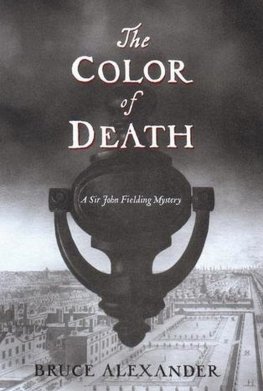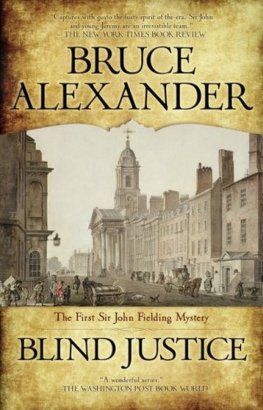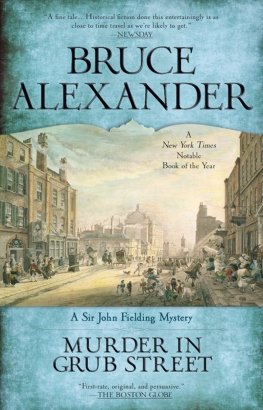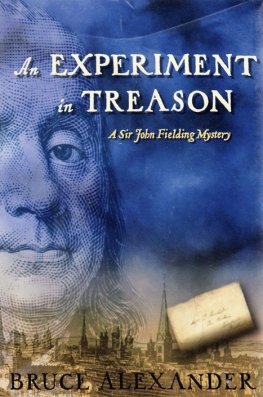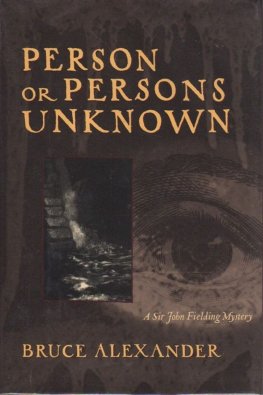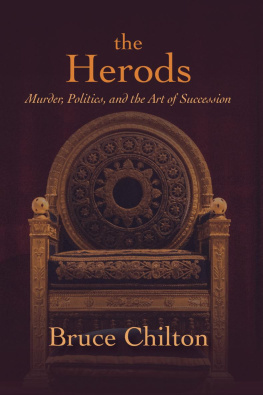Bruce Alexander - The Price of Murder
Here you can read online Bruce Alexander - The Price of Murder full text of the book (entire story) in english for free. Download pdf and epub, get meaning, cover and reviews about this ebook. genre: Detective and thriller. Description of the work, (preface) as well as reviews are available. Best literature library LitArk.com created for fans of good reading and offers a wide selection of genres:
Romance novel
Science fiction
Adventure
Detective
Science
History
Home and family
Prose
Art
Politics
Computer
Non-fiction
Religion
Business
Children
Humor
Choose a favorite category and find really read worthwhile books. Enjoy immersion in the world of imagination, feel the emotions of the characters or learn something new for yourself, make an fascinating discovery.

- Book:The Price of Murder
- Author:
- Genre:
- Rating:3 / 5
- Favourites:Add to favourites
- Your mark:
- 60
- 1
- 2
- 3
- 4
- 5
The Price of Murder: summary, description and annotation
We offer to read an annotation, description, summary or preface (depends on what the author of the book "The Price of Murder" wrote himself). If you haven't found the necessary information about the book — write in the comments, we will try to find it.
The Price of Murder — read online for free the complete book (whole text) full work
Below is the text of the book, divided by pages. System saving the place of the last page read, allows you to conveniently read the book "The Price of Murder" online for free, without having to search again every time where you left off. Put a bookmark, and you can go to the page where you finished reading at any time.
Font size:
Interval:
Bookmark:
Bruce Alexander
The Price of Murder
ONE
I, who had recently become engaged to be engaged with Clarissa Roundtree, did walk with her on a Thursday morning in April 1774. We went hand in hand, as was her wish. Through the great market in Covent Garden we went. In the usual way of it, the Garden, which it was most often called, was strong-smelling, crowded, and noisy. Greengrocers hawked the quality of their carrots and new potatoes. Ballad sellers sang their wares. All England, it seemed, had gathered there that they might make proper preparations for the coming Easter holiday.
As it happened, this years Easter held special significance for Clarissa. She was quite determined that we publish our banns of marriage as soon as the Lenten season had passed.
But Clarissa, said I, objecting, what use is there publishing our banns when we cannot yet marry?
Oh Jeremy, you know far better than I that we need not be married after the banns are posted. Its simply that we can be married thereafter. We shall then be officially engaged.
Yet what then is the use of being officially engaged when we shall not have money enough to marry for years to come?
At that her face quite fell. Years? she echoed, as if having learned of this for the first time. It was always the same: she urging us forward, racing ahead, and I given the uncomfortable job of applying the brake. She knew the realities of our situation as well as I. Still, each time we discussed it, it seemed necessary to get her to admit that she knew what she knew.
I set about to do just that. Did I convince her? I doubted it. And she proved me right shortly thereafter by making me go through it all once again. Probably I did wrong by taking the same tack over and over. I did ever return to the matter of money. One could not marry if one had not enough of it to support a wife. That much seemed simple enough, did it not? Ah, but Clarissa was clever, for, each time she introduced the matter of marriage, she did so in some new way. This time, as an instance, she brought in the matter of the banns. What, I objected, was the use of posting banns if there could be no marriage for two years to come (when I should reach my majority and pass the bar)? Yet I understood her design well enough: she thought to marry me by degrees. Knowing full well that we could not be married till the banns first be posted, she meant to have that out of the way, so that she might then concentrate upon getting us before a priest. Much as I would have her-and have her at the soonest-I saw no way for it but to wait. I loved Clarissa dearly, yet I would not give up the career in the law that I dreamed of-no, not even for her.
Besides, what would Sir John and Lady Fielding say? They depended upon us now more than ever. We knew better than they that Molly Sarton, our cook, would soon be leaving them. She and Mr. Donnelly-surgeon, physician, and my great friend-would be married by the end of the year. Though Sir John and his lady were not privy to the information, as we were, they knew, or assumed, this was what lay in the near future for them. For this reason, Clarissa was being readied to take her place. Under Mollys cool supervision, she was learning her lessons well, yet in this week to come, she would be put to the test. Molly had agreed to hold a cooking class for the girls and women at Lady Fieldings Magdalene Home for Penitent Prostitutes. It had been agreed that Molly could not cook and teach simultaneous, and so it fell to Clarissa to do all that needed to be done at home, unsupervised and independent. Needless to say, this would include buying food for the family in the Garden. Thus had we set out together that morning-I to teach her where the best might be bought, and she to learn.
As for myself, it seemed that Sir John found more uses for me than ever before. First and most frequent, a magistrate, and most specially a blind magistrate (as he was), depended greatly upon his clerk, and Sir Johns clerk, Mr. Marsden, was less and less dependable (and this through no fault of his own). Truth to tell, the clerk had never fully recovered himself following his bout with influenza late the year before. His lungs were the trouble, right enough. He wheezed and coughed and generally behaved as one not far from the grave. I did at first believe twas naught but a nasty catarrh that hung upon him all through the winter, and told myself that as spring approached he would improve. Yet he did not, and when I questioned Mr. Donnelly about it, he shook his head and said he thought it was something more serious, though he could not say exactly what it was. Then did he add: If he would but give up that pipe of his, or at least cut down his smoking of it, he would be much improved. Yet, when I passed this on to Mr. Marsden, he laughed at me straightaway and said that life without the pipe would be no life at all. He must have missed a good quarter of his days beside Sir John, and who was there to take his place? None but your humble and obedient servant. In his absence, I discharged his duties as best I could and heard no complaint from Sir John Fielding. For myself, I quite enjoyed working in Mr. Marsdens stead. He knew something of the law, and I knew a great deal more. I specially liked interrogating the prisoners and the disputants before they were to have their time before the magistrate. It helped me ever after in the work of cross-examination.
Clarissa had been with me on earlier days during a number of my trips to the market. Yet there was then naught for her to learn upon such occasions, and she did simply hang on my arm and marvel at my ability to choose exactly the right vegetables for a stew. Today, of course, was different. She was here to discover all she might about how a potato got its eyes and what they, if sprouting, might portend; how to tell a tasty carrot from one that simply filled your belly; and what, if anything, a mushroom might tell you about its possibly poisonous nature. She was, in other words, learning all that she could from me in as short a time as possible. Thus did we spend the better part of an hour there in Covent Garden with no further talk of banns or marriage. Twas for me a blessed relief.
I believe we were at the stall of Mrs. Malter, who always seemed to have the best apples to be found in the Garden, when I happened to glance up and see before me a girl of sixteen or seventeen, who was staring quite intently at us. Who was she? She looked familiar to me, but in the course of the day, I saw so many in a city as large as London. Yet it was at Clarissa that she seemed to be staring and not at me. Then, as she began to move across the fifteen feet or so that separated us, I nudged Clarissa and nodded toward the unknown girl.
Do you know her? I asked. She seems to know you.
Indeed she did. As Clarissa looked up, the girl saw her better, and, having her doubts thus removed, she fair flew at us, arms open wide.
Elizabeth Hooker! cried Clarissa. Is it you, truly?
Clarissa!
Then, arms wrapped so close round each other that they seemed as a single being, they danced before Mrs. Malters stall, each talking at the other, neither able to hear for the noise she made.
It was quite unlike Clarissa to make such a spectacle of herself in a place so public. I knew not whether to attempt to pull them apart or to allow them simply to exhaust themselves then and there. At last, having run out of energy, they stopped, stared each at the other, and fell to laughing quite uproariously. The next few minutes were spent asking and answering questions. Both were from Lichfield. Each had come to London within months of the other (Elizabeth, I believe, had come later than Clarissa). Their fathers had died, and both girls had gone into service-Elizabeth as a kitchen slavey in the residence of Richard Turbott, silversmith, of Chandos Street; and Clarissa as a secretary and personal assistant (and, sometimes, maid and cook, as well) for Lady Fielding. The two made plans to visit the next day, since Miss Hooker had been given free the entire time from Friday to Monday, as the Turbotts would be out of town for Easter.
Font size:
Interval:
Bookmark:
Similar books «The Price of Murder»
Look at similar books to The Price of Murder. We have selected literature similar in name and meaning in the hope of providing readers with more options to find new, interesting, not yet read works.
Discussion, reviews of the book The Price of Murder and just readers' own opinions. Leave your comments, write what you think about the work, its meaning or the main characters. Specify what exactly you liked and what you didn't like, and why you think so.

